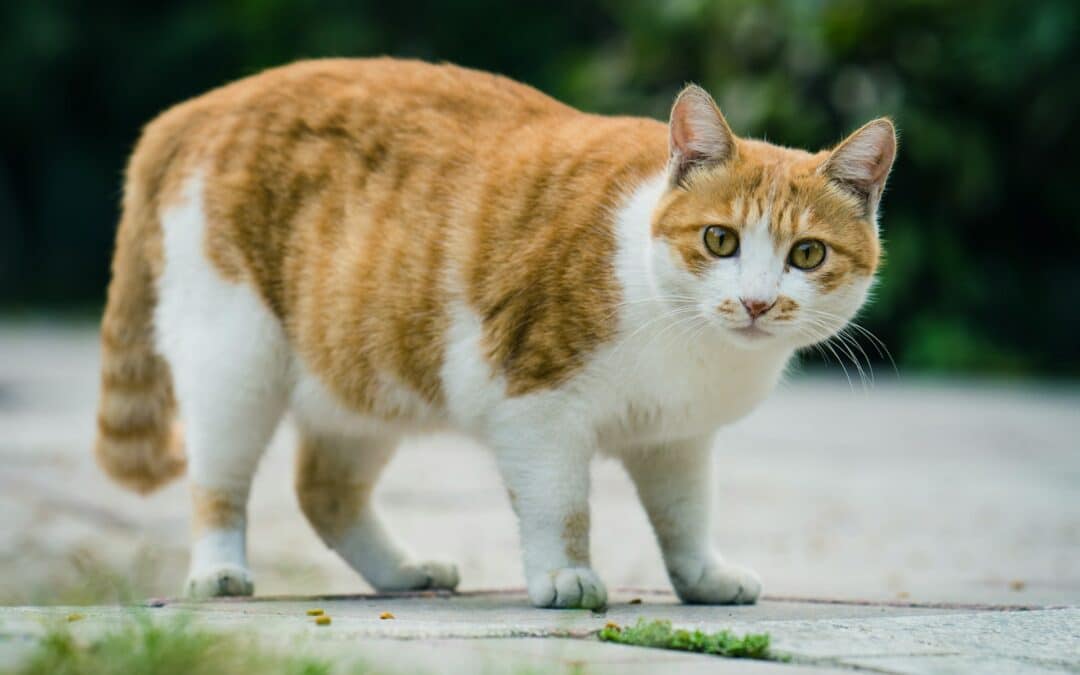Maintaining an ideal weight is very important for your cat’s health. Obesity can cause many health problems and shorten your cat’s lifespan. Underweight cats are also more susceptible to illness, and if your cat is too skinny, it could indicate poor health. Understanding how much your cat should weigh and helping them stay in that weight range will keep them healthy and fit.
What Is a Healthy Weight for Cats?
Healthy cats come in all shapes and sizes. The weight your cat should be depends on several factors. Their breed, their frame, and even their fluffy fur play a factor! For example, the Singapura cat is the world’s smallest breed, weighing between 4 to 6 pounds. The Maine Coon cat is the world’s largest breed, and they can weigh up to 25 pounds!
Healthy cats should have a thin layer of fat. You should be able to feel the ridges of your cat’s ribs, but you should not be able to see them. A cat’s body should also have a slight hourglass shape. When looking down at your cat from above there should be a little dip in below the rib cage and above the hips.
For cats that are extra fluffy, it can be hard to see their body shape. Instead, you can gently feel your cat’s body after brushing out their fur. If you are unsure about your cat’s weight, check with your veterinarian to find out if they are healthy.
When to Put Your Cat on a Diet
If your cat is overweight or underweight, they might need to eat a special diet to improve their health. But don’t make any changes without consulting a veterinarian. Suddenly reducing your cat’s food portions can cause serious harm. Your vet can advise you on the best method for helping your cat lose weight, and recommend the perfect portion sizes to ensure that your cat is receiving proper nutrition and hydration.
If your cat is underweight, it is equally important to visit the veterinarian. Rapid weight loss can often be a sign of something serious. But as long as your pet is not suffering from any illnesses, your veterinarian will help you find ways to bulk up their diet.
Three Tips for Maintaining a Cat’s Weight
1: Monitor Their Food Intake
Overeaters and undereaters alike should be monitored to ensure they are getting the right amounts of food and water. If you have multiple pets, it is even more important to prevent your pets from eating each other’s food. You may need to schedule different feeding times or feed them in separate rooms.
2: Schedule Extra Play Time
Exercise is an important part of keeping your cat mentally stimulated and helping them maintain a healthy weight. It helps heavy cats shed a few ounces, and helps skinny cats work up an appetite.
3: Visit Your Veterinarian at Least Once a Year
Every year it is important to schedule a veterinary exam. Along with vaccination boosters, your cat will get a full physical that includes stepping on a scale. If your cat is over or underweight, your vet will advise you on the best ways to get them back to a healthy range.
Veterinary Care That Pulls Its Weight
Taking care of your pet’s health means taking them to a trusted veterinarian at least once a year. Here at East Valley Animal Hospital, we are committed to helping you keep your pets in good health so they can live a long and happy life with you. If you have any concerns about your cat’s weight, please contact us today for an appointment.
Images used under creative commons license – commercial use (1/10/25). Photo by Li Lin on Unsplash.

